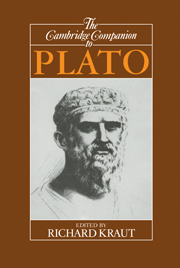Book contents
- Frontmatter
- 1 Introduction to the study of Plato
- 2 Plato
- 3 Stylometry and chronology
- 4 Socrates and the early dialogues
- 5 Mathematical method and philosophical truth
- 6 Inquiry in the Meno
- 7 Plato and Greek religion
- 8 Platonic love
- 9 Plato's metaphysical epistemology
- 10 The defense of justice in Plato's Republic
- 11 Plato on poetic creativity
- 12 Good-bye to the Third Man
- 13 Plato's Sophist on false statements
- 14 Disintegration and restoration
- 15 Plato's later political thought
- Bibliography
- Index
2 - Plato
The intellectual background
Published online by Cambridge University Press: 28 May 2006
- Frontmatter
- 1 Introduction to the study of Plato
- 2 Plato
- 3 Stylometry and chronology
- 4 Socrates and the early dialogues
- 5 Mathematical method and philosophical truth
- 6 Inquiry in the Meno
- 7 Plato and Greek religion
- 8 Platonic love
- 9 Plato's metaphysical epistemology
- 10 The defense of justice in Plato's Republic
- 11 Plato on poetic creativity
- 12 Good-bye to the Third Man
- 13 Plato's Sophist on false statements
- 14 Disintegration and restoration
- 15 Plato's later political thought
- Bibliography
- Index
Summary
INFLUENCES ON PLATO
We lack the materials for a proper biography of Plato. He hardly refers to himself at all in the dialogues. The ancient “Lives” are infected by gossip, legend, and fiction and the ostensibly autobiographical Seventh Letter is probably spurious. Fortunately, however, Aristotle provides us with important evidence on Plato's intellectual development. He says that Plato was first influenced by Cratylus the Heraclitean, and later by Socrates (Met. 987a32-bio). It is unlikely that Aristotle derived his claim about Craytlus from reading Plato's dialogues; he probably had some independent source. And since he was probably well informed about Socrates and Plato, his statement deserves to be taken seriously.
Aristotle implies that Plato is influenced both by the older, “pre-Socratic” tradition of the “naturalists“ (phusiologoi; cf. Aristotle, De Caelo 289b25-9) and by the more recent application of philosophy to moral and political questions. What, then, did Plato find when he looked at these two movements in Greek philosophy?
- Type
- Chapter
- Information
- The Cambridge Companion to Plato , pp. 51 - 89Publisher: Cambridge University PressPrint publication year: 1992
- 4
- Cited by



